UKRAINE: NO TO WAR (НЕТ ВОЙНЕ)
(all quotes, hyperlinks, and Twitter accounts cited to do not reflect the opinions of the author, but are gathered to provide additional context and evidence)
The war on Ukraine by the Russian Federation came as a gut-punch.


In the days before the invasion, a massive troop buildup along the Ukrainian border signaled Russian anxieties, but few Russian journalists expected the unexpected, knowing all too well that an invasion of Ukraine would mean the end of Russia as we know it, and disbelieving in Putin’s resolve to wager the future of Russia over the existential threat posed by a smaller neighbor such as Ukraine.
This general disbelief was in part motivated by observers’ mounting realization that an actual invasion “would not look like the limited offensives Russia mounted in Ukraine in 2014 and 2015” when Russian ‘little green men’ sought territorial leverage over the political destiny of Ukraine through hard power in the separatist-controlled breakaway regions (of Donetsk and Luhansk) and soft power via the Minsk I-II protocols (the 2014-2015 ceasefire deals that resulted in the “frozen” status of the conflict in Eastern Ukraine).
Those observers who were more certain of an impending invasion forewarned of “incredible destruction” — irrespective of the consequences — if Russia were to move to “right the historical wrongs” raised by Putin in several rambling ad-hoc justifications of Russia’s aggressive posturing towards Ukraine.
To invade Ukraine would be to give up that strategic leverage and risk full-scale war and face the economic and social consequences. Russia would be committing a dramatic act of betrayal of cultural-religious-historical-neighborly proportions, risking the wrath of the “West” (the United States, European Union, and NATO), committing its soldiers to a likely unpopular war (regardless of public opinion in the short-term), the self-destruction of the Russian economy already on the brink of disaster through the cost of war and sanctions (on finance and potentially energy), and forever changing the status quo international security architecture in Europe and beyond, let alone bringing unwarranted death and destruction, suffering and misery, to the Ukrainian people and soil. Analysts considered this too high a price for a “rational” and “strategic” Putin to pay.
Instead, rebuking reason, Putin went ahead and committed about a third (50,000) of the Russian military buildup (150,000) to invade Ukraine from the North (with the complicity of Belarus) from Belgorod to Kharkiv and onward to Kiev (taking Chernobyl on the march); from the East through the separatist-controlled breakaway regions of Donetsk and Luhansk to Mariupol; and from the South from the occupied Crimean peninsula from land and from sea to Kherson, including against the Ukrainian held Snake Island off the coast from Odessa. Why?
In addresses before the Russian nation, Putin recylced three reasons: historical grievances related to Soviet nationality policies, claims of “genocide” against ethnic Russians, and the de-Nazification of the Ukrainian government — a crude stand-in for the “right-wing” nationalism proxying for Putin’s disregard for Ukrainian independence. All three claims are invented. All three claims are pierced easily by facts or information on the ground.

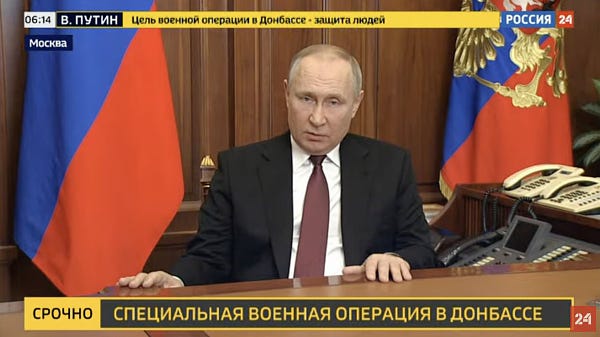
As appeals made directly by Ukrainian President Zelensky retorted to the Russian nation:
They tell you that we’re Nazis. But how can a people that lost 8 million lives to defeat the Nazis support Nazism? How can I be a Nazi? Say it to my grandfather, who fought in World War II as a Soviet infantryman and died a colonel in an independent Ukraine. They tell you that we hate Russian culture. How can one hate a culture? Any culture? Neighbors always enrich each other’s cultures. However, we are not part of one whole. You cannot swallow us up. We are different. But this difference is not a reason for enmity. We want to determine our own course and build our own history: peacefully, calmly, and honestly.
They told you that I would order an attack on Donbass, order indiscriminate shootings and bombings. This leads to some questions, some very simple ones. Who are we shooting at? What are we bombing? Donetsk, which I have visited dozens of times? Where I looked in people’s faces, in their eyes? Artyoma Street, where I strolled with friends? The Donbass Arena, where I rooted for our boys together with Ukrainian lads at the European Championships? Shcherbakov Park, where I drank with friends when our boys lost? Luhansk, where the mother of my best friend is buried? Where his father also rests? Take note that I am speaking to you all in Russian now, but no one in Russia knows the meaning of these places, these streets, these names, these events. These are all alien to you, unfamiliar.
Regardless of the veracity of Putin’s claims, Russian state-owned media sounded the drum of “genocide” against ethnic Russians in the separatist-controlled breakaway regions, prompting a Russian “peacekeeping mission” into Ukraine. The Russian people without access to independent media are still being told that this “peacekeeping mission” is a limited action outside of the major cities without the targeting of innocent civilians. Putin has since doubled down on his claims, repeating a chorus of “Nazis” and “drug-dealers” as if the Ukrainian government lurked in the shadows of a Moscow alleyway, personally threatening the safety of Putin’s own “dvor”.
These rhetorical twists and turns are lies. Even so, in the hours after these fantasized accusations, Russian armed forces launched missile strikes inland on Ukrainian strategic facilities and airports before beginning a massive land invasion rolling tanks and armaments into the cities of Northern, Eastern, and Southern Ukraine.
Yet, in the first few days of the war, Kiev has held. Ukrainian President Zelensky has not fled — instead asking for “ammunition, not a ride.”

The Ukrainian armed forces have proven resilient. While Ukrainian refugees continue to flood the borders of Poland, Moldova, Hungary, and Romania, many Ukrainian men and women said goodbye to loved ones to stay and fight, craft Molotov cocktails, and berate Russian troops on the streets of their cities. This war did not end in a Russian blitzkrieg, but has revealed the bravery of the Ukrainian people, and the unveiled tragedy of neighbors fighting neighbors, enemies that can speak the same language back to you, curse your graves with the seeds of sunflowers, stop and ask if your tank has run out of gas, or claim to be ethnically Russian all the same, living in the independent and sovereign state of Ukraine, and demanding that you take your !@#$%^&* back to !@#$%^&* Russia, !@#$%^&* your Russian warship, and take !@#$%^&* street to !@#$%^&*-ville (in Russian).




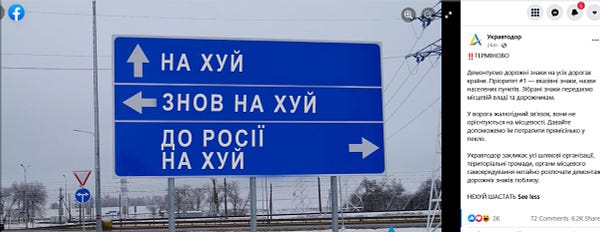
In Russia, the Russian people took to the streets, but just as a grassroots anti-war movement started to get off the ground, it was met by fierce arrests across more than 50+ Russian cities by the same uniformed riot police officers that have harangued Russian civil society for a decade.
Some celebrities have spoken out, such as rapper Oxxxymiron, calling for a national anti-war movement, but the brutal truth is that Russian state-media has controlled the national narrative, restricting protest to the best- and most-informed Russians seeking out alternative news channels.


Russia has responded by throttling Facebook and Twitter and setting its sights on many of the biggest and best Russian independent media outlets, banning the mention of the phrases “attack,” “invasion” or “declaration of war” in domestic media, and taking aim at Dozhd (TV Rain), Novaya Gazeta, and Echo of Moscow, among others. YouTube appears to be next up on the chopping block, the veritable last bastion of media freedom and all-important disseminator of Russian alternative media, opinions, and resources, especially among the youth.

Finally, in the last few hours, Dozhd (TV Rain) and Echo of Moscow closed their doors, liquidating their channels in the face of mass media censorship, followed by reports that Russia has blocked the App Store and Google Play, all but shutting off Russians from internet freedom.




The Western response to the invasion of Ukraine was initially slow to pick-up, as Biden waited overnight (U.S. time) before speaking publicly to the nation and the world, unveiling sanctions on the biggest Russian banks (VTB and Sberbank). The UK and Europeans have followed suit, targeting sanctions at the highest-ups in the Russian security council, including Putin himself, restricting trade, preventing banking transactions in $$$ and €€€, and ending relations with Russian airlines and space program. Noticeably absent in the first days of the war was a measure to kick Russia out of SWIFT (The Society for Worldwide Interbank Financial Telecommunication) due to Russian leverage over the German, Italian, Hungarian, and Cypriot economies. Since then, the multi-faceted Western sanctions regime has been unveiled, stifling the Russian economy, central bank, and Ruble, and forecasting an impending economic crisis.

Ultimately, a united European Union came around to tacitly support a SWIFT action against Russia as the last holdouts were swayed by the destruction in Ukraine. Other international organizations moved quicker, as UEFA removed the Champions League Final from St. Petersburg on May 28, Eurovision kicked Russia out of its starstruck song contest, and the Council of Europe banned Russia from its human rights organizations. Since then, numerous international organizations and competitions have suspended Russian membership, the United Nations has voted to ‘sanction’ Russia’s behavior with only few typical abstentions, and Western companies have extirpated themselves from Russian markets as well as removed “Russian” vodka from their shelves.
Russia’s response has been indignation, promising retaliatory sanctions, and turning inward to quiet dissenting voices at home. Former Russian Prime Minister and interim President posted to VKontakte claiming that this was “A good opportunity to restore a number of important institutions to prevent especially serious crimes in the country – such as the death penalty for the most dangerous criminals” — signaling a return to corporal punishment following the expulsion of Russia from the Council of Europe. Ordinary Russians fear that the days to come will bring Martial Law and have begun to flee the country.




The intermittent negotiations between Russia and Ukraine, whose government remains steadfast from its underground bunkers in Kiev, have thus far ended in Russia’s refrain of “de-Nazification” — that is to say, leaving nothing on the table.

In Russia, the forthcoming economic blowback is likely to be severe. The Russian stock market plunged and closed trading as the Ruble has collapsed. Russia’s national wealth fund is weak and unlikely to weather the coming storm of sanctions, precipitating a financial disaster that could close in on 1990s level misery for the Russian people. Russian oligarchs on the other hand famously hold their wealth abroad or offshore, still eluding many of the sanctions targeted at them.
Actually purging these illicit funds from their out-sized influence on global finance could result in a sea change in the transparency governing the relationship between campaign finance and democratic accountability, adding another layer on top of economic attrition with the Russian Federation.

The U.S. has decided to go further and sanction the Russian Direct Investment Fund, intended to further cripple the Russian economy. Days ago, Putin summoned his oligarchs and owners of the largest businesses in Russia to the Kremlin for a “conference” that ended in tepid questioning and many sour looks. No one knows how long the trajectory of the Russian economy will continue to satisfy its main players.

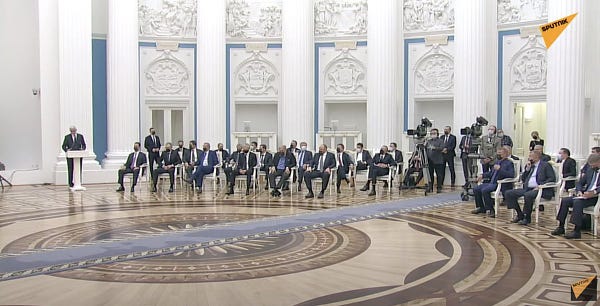
Putin’s gamble, that he had enough leverage over the “West” via Russian economic influence (finance and energy), over Ukraine via Russian military buildup and the supposed “weakness” of Ukrainian civil society, and over the Russian people via propaganda, state-owned media, and the brutal repression of civil society, seems to have been a grave miscalculation with only kernels of truth rather than a full estimation of Ukrainian resistance.

Instead, Putin’s estimations (or delusions) have come to naught:
Some people have speculated that Putin’s isolation during COVID has contributed to these delusions, but being in power for 20 years doesn’t help either. It can foster a kind of hubris, this sense of being all powerful. He’s eliminated almost all resistance in Russia and has waged successful military campaigns in Georgia, Crimea, and Syria—so no one’s talking back to him. He’s surrounded by people who only say yes.
Others have also speculated that Putin’s attack on Ukraine comes from a winnowing opportunity structure, motivated either by his own health or a coming storm in the Russian economy, civil society, or consolidating “Western” unity, though Putin’s attack on Ukraine has done more to worsen all three of these latter constraints than before his invasion of Ukraine.

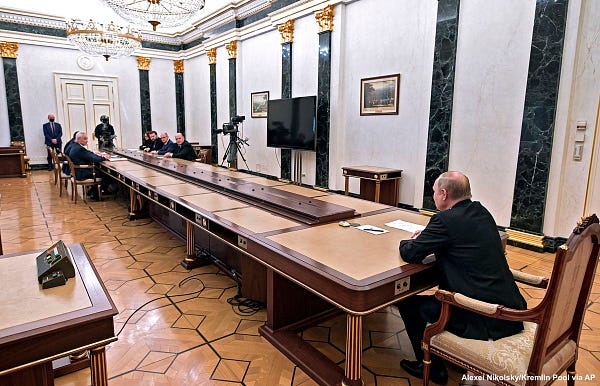
Indeed, it looks as though the “West” has united around Ukraine, and actually strengthened its resolve — particularly over sanctions — over the past few days, even as Ukrainian President Zelensky’s requests to join the EU and NATO have yet to be officially acknowledged (only Poland and the Baltic States unconditionally support the Ukrainian entrance into the European Union). Instead, appeals for more ammunition and supplies have been answered, and even Germany has moved to provide military armaments to the Ukrainian defense force, as newly bankrolled weapons and aircraft have been promised to the defenders.
Ukrainians have suffered. Many civilians have died. Errant missiles have taken chunks out of by-standing apartment buildings in Kiev and the battle for Kharkiv has destroyed much of the historical city.



Russia too has suffered. A leaked report has identified over 3,500 invading Russian soldiers killed or captured. Meanwhile, Putin has finally addressed the losses of Russian solders on state television after days denying escalation of the conflict.

At home, Russian anti-war protestors have been beaten and arrested, while countless economic opportunities are lost, pariah status and xenophobia lurk in the foreground, and a tumultuous economic catastrophe looms in the dark days ahead.


Already, a few communist MPs have spoken out against the war in the Russian State Duma, but there is still mostly silence on the Russian domestic front, as state propaganda and state-owned media channels continue to spin misinformation on the complicity, extent, and stakes of the war in Ukraine, followed by continued denialism and/or disbelief.

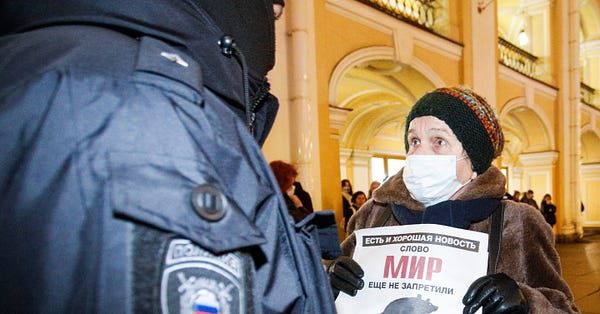



We can only hope that death and destruction are avoided and bravery and hope and peace prevail. Ukraine will continue to exist in one form or another, as this national invasion has turned a fragmented country into a bastion of resilience behind its unlikely wartime hero-president, thrust from the stage onto the world’s biggest stage.
How this war ends remains a mystery, as calls for negotiations have been raised and subsequently swallowed as the fight for Kiev continues, with ominous rumors of more Russian troops committed to the field to come. The most recent negotiations suggest that humanitarian evacuation zones will be established, just as Russian airpower has begun to bomb civilian zones in a further escalation of the conflict. Finally, Kherson has become the first Ukrainian city to fall under Russian occupation, spelling out a model for occupation that seems to be part of Russia’s ultimate agenda in Ukraine — to occupy and/or de-militarize Ukraine or escalate the crisis further to dire consequences.



What is for certain is this war changes everything in Eastern Europe. It breaks myths as it breaks soil, and creates new legacies of brotherhood just as it spins new tales of betrayal between neighbors and two deeply interconnected cultures and societies.
Russia and Russians will also suffer because of Putin, possibly more than they have done so already, and rehabilitating Russia into the international economic and political system in the aftermath of these events will undoubtedly be a painful process on a scale compared to the ramifications of sanctions on Iran. The ability of sanctions to dissuade Putin seems unlikely, as Russian forces remain committed to the field, but the social and economic destruction of the fabric of Russian society will test the willpower and imagination of the Russian government , and are likely to lead to increased pressure on Putin from within or without.

This gut-punch will leave deep bruises in the psyche of everyone involved, from the parents of defenders and invaders, to the children sheltering in subways and kindergartens, and the disbelievers that will one day find and confront the history before their eyes. There is much more to be written. Let us hope and believe in peace.

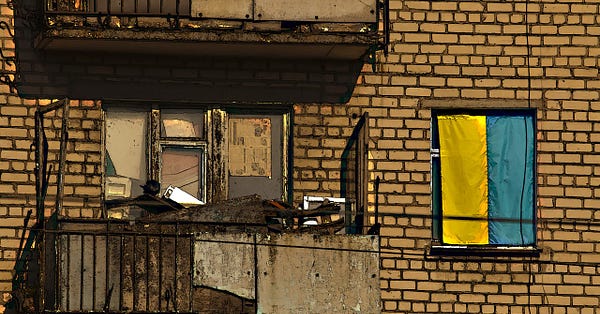
UPDATES IN PICTURES:
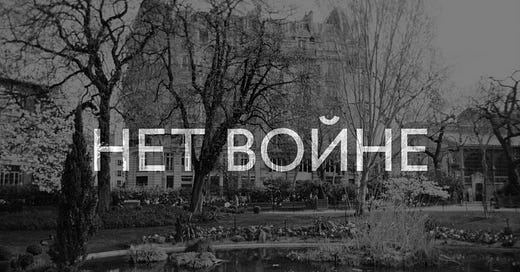



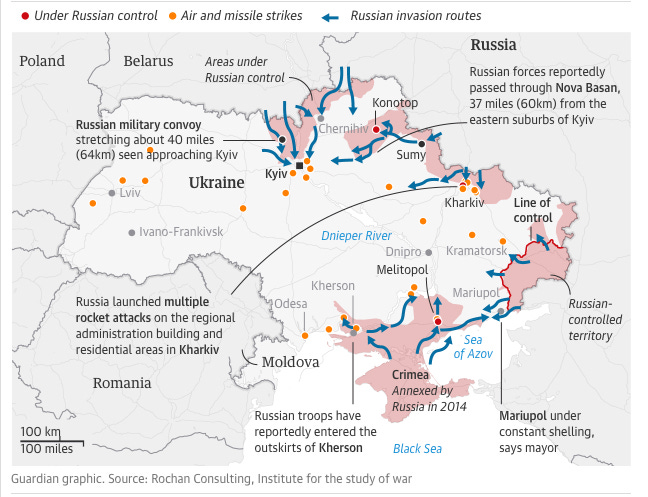
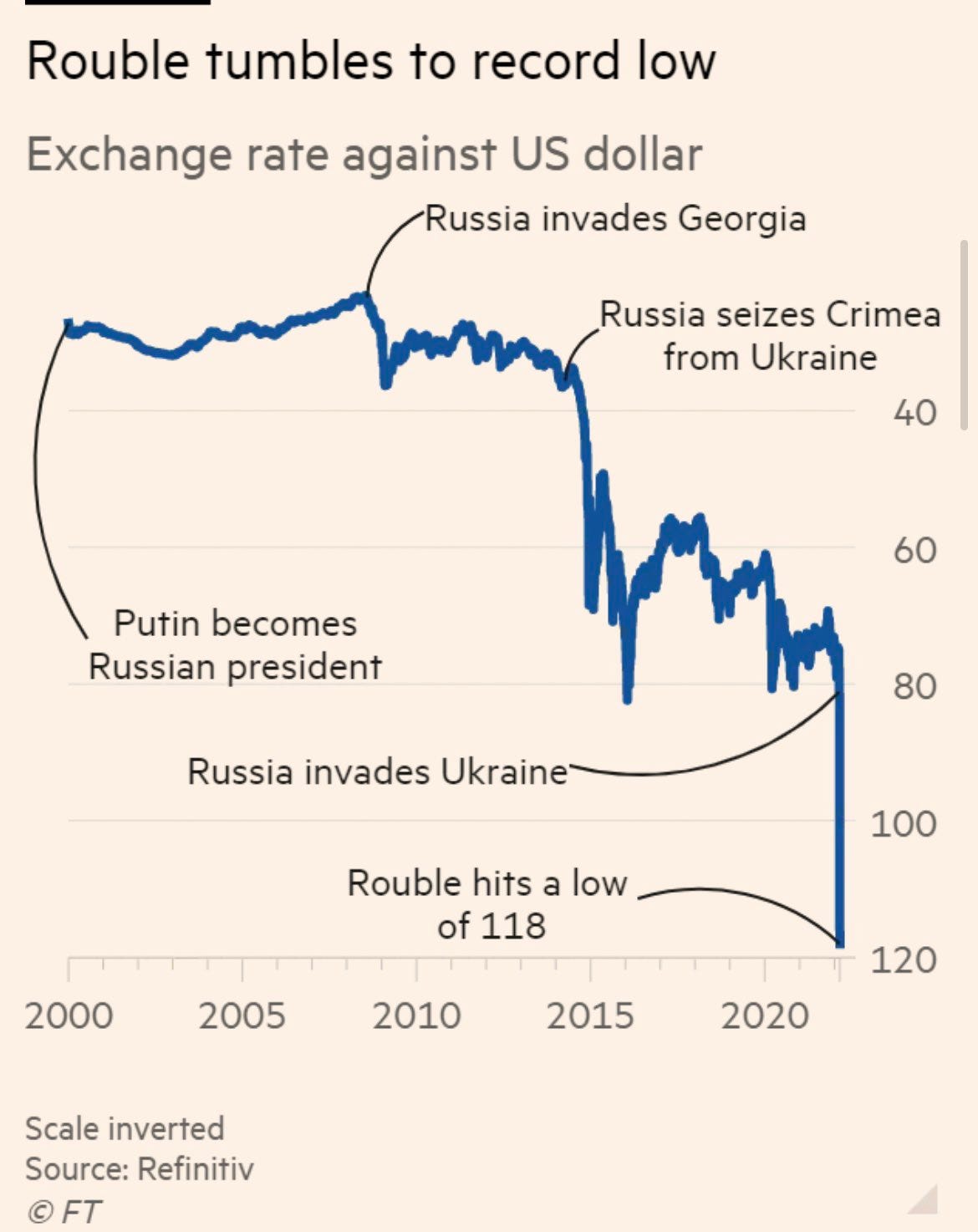
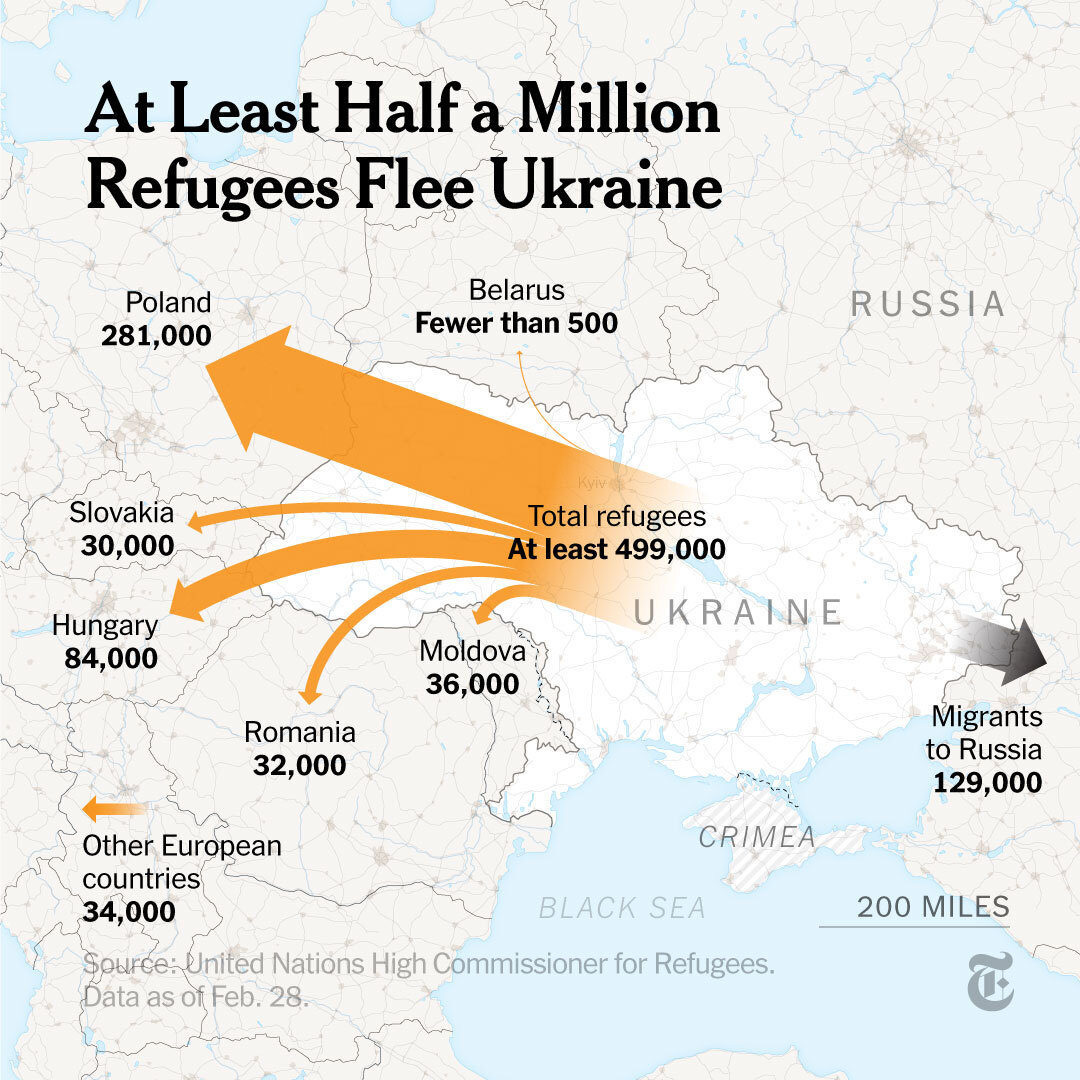
Thanks for sharing this, Otto.
Putin's pathology is simple. His lust for power far exceeds anything remotely resembling any form of empathy he may once have had for his own people. He now lives in a bubble of his own making which includes only the wealthiest of the wealthy, the oligarchs that keep Russia's fragile economy afloat. He'll get away with what he's doing but only at a very high cost to the Russian people. Through his own wealth he'll be fine, but the people will suffer and in the end, by the Grace of Goodness, they will finally take him down. That is the hope and that is what we all must pray for, for the sake of democracies everywhere.